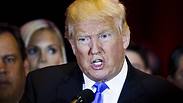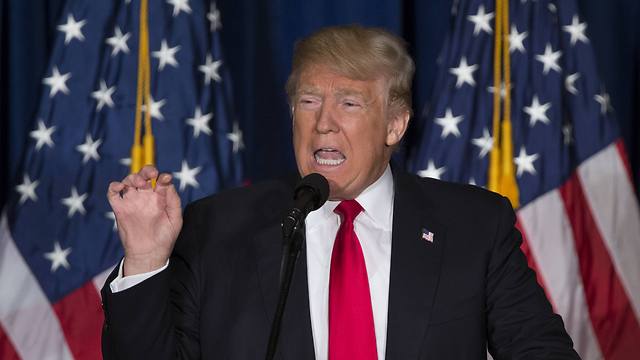
Donald Trump
צילום: EPA
Trump vows to put 'America first,' criticizes Obama for 'snubbing' Israel
In his largely anticipated formal foreign policy speech, the US Republican presidential hopeful laid out a policy putting his country before others and slammed the current administration's treatment of the Jewish State.
In his first formal foreign policy speech, US Republican front-runner Donald Trump vowed Wednesday to put American security "above all else" if elected president and accused President Barack Obama of snubbing Israel.
Many elements of Trump's speech were similar to his typical campaign remarks, but he delivered them in a much more sober, restrained manner. Critics have said repeatedly that he has not shown an ability to act and sound "presidential."
Despite his argument's main thrust of America coming first, Trump did spend some time criticizing the way that the current American administration has related to its allies. "Israel, our great friend and the one true democracy in the Middle East, has been snubbed and criticized by an administration that lacks moral clarity," said Trump.
He continued to specifically deride the administration's top two men: Just a few days ago, Vice President Biden again criticized Israel—a force for justice and peace—for acting as an impediment to peace in the region. President Obama has not been a friend to Israel. He has treated Iran with tender love and care and made it a great power in the Middle East—all at the expense of Israel, our other allies in the region and, critically, the United States."
Trump opined that the administration's treatment of its allies would lead to a straining or disintegration of those ties. "We’ve picked fights with our oldest friends, and now they’re starting to look elsewhere for help."
Trump—fresh off a sweep of five Northeastern primaries that pushed him closer to the GOP nomination—sought to expand on foreign policy views that have lacked detail and worried experts in both parties. Still, he left major questions about his proposals unanswered, including his plan for defeating the Islamic State group, casting his sparse details as a strategy for catching America's enemies off guard.
"We must, as a nation, be more unpredictable," Trump said. The businessman read his remarks off a teleprompter, a notable change for a candidate who typically speaks off the cuff and has mocked his rivals for giving prepared speeches.
Trump appeared to send a mixed message to America's allies. He doubled down on his previous assertion that other countries must contribute to international security agreements, such as NATO, if they're to get the benefits of American military protection. Yet he also assured allies that the US will have a renewed commitment to its overseas friends if he's elected president.
"To our friends and allies, I say America is going to be strong again, America is going to be reliable again," Trump said. "It's going to be a great and reliable ally again."
Many elements of Trump's speech were similar to his typical campaign remarks, but he delivered them in a much more sober, restrained manner. Critics have said repeatedly that he has not shown an ability to act and sound "presidential."
He spent much of his speech panning President Barack Obama's handling of crises in the Middle East, saying the current administration was leaving a legacy of "weakness, confusion and disarray."
"We've made the Middle East more unstable and chaotic than ever before," Trump said. He singled out Democratic front-runner Hillary Clinton's handling of the deadly attacks on a US compound in Benghazi, Libya, and repeatedly linked the former secretary of state to what he sees as the failures of the Obama administration to show strength around the world.
Even before Trump's address, Clinton's campaign blasted out a news release saying the Republican leader has used "the most reckless rhetoric of any major presidential candidate in modern history."
Still, Trump didn't spare former Republican President George W. Bush, criticizing his efforts to bring democracy to the Middle East and reaffirming his own opposition to the unpopular Iraq war. Drawing a contrast with hawkish Republicans, Trump said "war and aggression will not be my first instinct" and pledged to deploy combat forces only as a last resort.
Trump spoke to an invited audience of conservative-leaning national security experts, as well as some prominent foreign policy writers.
Trump's advisers cast Wednesday's speech as the first in a series of policy addresses aimed at calming the nerves of Americans who worry the businessman doesn't have the experience to handle the range of responsibilities that land on a president's desk. A speech on trade is expected soon.











